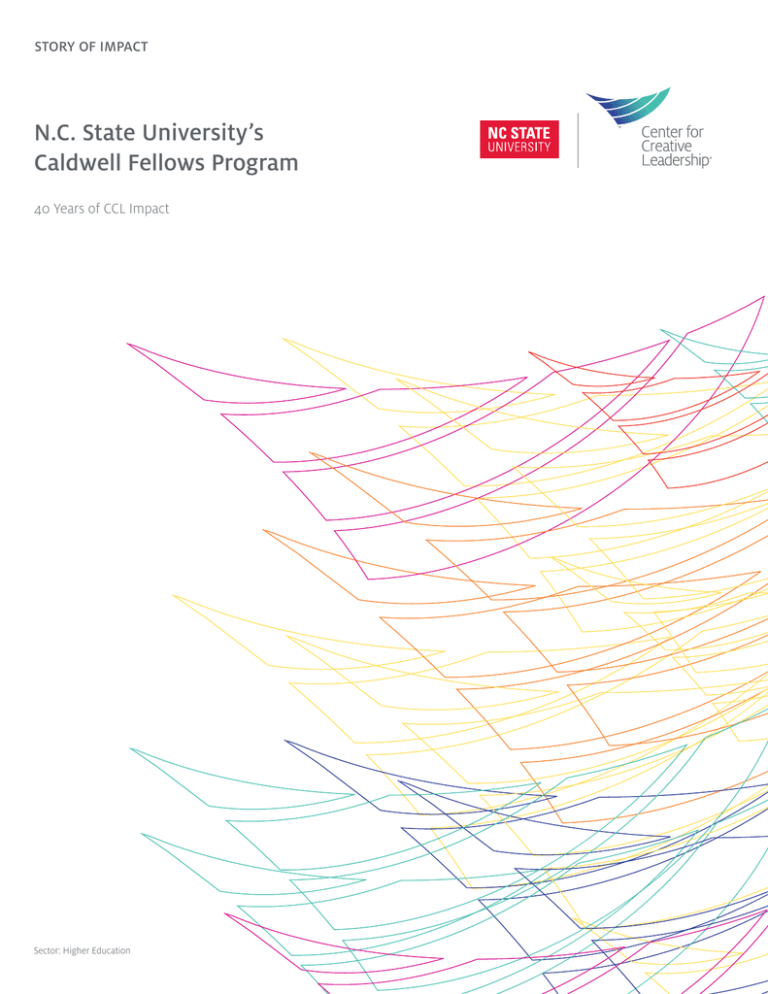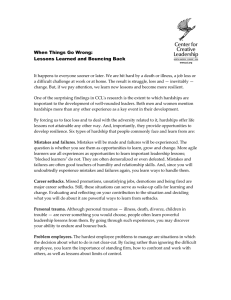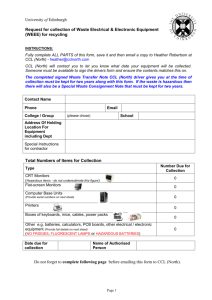
STORY OF IMPACT
N.C. State University’s
Caldwell Fellows Program
40 Years of CCL Impact
Sector: Higher Education
In 1972, the Smith Richardson
Foundation had a vision:
“Provide leadership
development training to
college students to maximize
their impact as new
professionals when they enter
the workforce.”
Having just provided the seed money for the Center
for Creative Leadership in Greensboro in 1970, the
Foundation funded, for the first five years, programs at
five colleges and universities. The goal was to provide
college students opportunities for the same rigorous
leadership development and education typically available
only to working professionals. By teaching promising
college students leadership skills before they entered
the workforce, the Foundation hoped to create waves of
young professionals who would lead in their companies,
communities and, ultimately, the world.
1
©2015 Center for Creative Leadership. All rights reserved.
It was an ambitious vision of leadership training,
especially in the early 1970s, and especially when
focused on college students.
At N.C. State University, that program became what is now
known as the Caldwell Fellows; it is one of just two of the
original five university programs that continue to this day.
(The other is the N.C. Fellows program at the University
of North Carolina at Chapel Hill; Duke University has since
created a similar program.)
The Caldwell Fellows embraced not only the Richardson
Foundation’s vision of educating young leaders, but also
legendary N.C. State Chancellor John T. Caldwell’s view that
the university should educate students to be successful
professionals, as well as servant-leaders who make the
world a better place.
For 40 years, CCL’s philosophy and training has been a vital
component of the program. A CCL associate is involved in
selecting Caldwell Fellows during their freshman year, and
CCL runs an intensive, three-day training program during
students’ junior or senior year as a capstone experience.
Delivering Intensive
Leadership Development
Students apply to the Caldwell Fellows program after
their first semester in college, ensuring that Fellows have
proven they can handle the academic rigors of college.
The selection process is intensive, including three essays
and multiple interviews for a group of about 50 finalists.
The goal is not necessarily to choose the students who
always win the top scholarships, but those “diamonds in
the rough,” says Bill Sternbergh, a CCL senior fellow for
leadership education who has taught Caldwell Fellows
since the program’s inception and is involved in selecting
Fellows. “There’s a glow, there’s a spark about wanting to
have an impact on the world,” he says. It’s not uncommon
for at least a few of the 25 Fellows selected each year to
be the first in their families to go to college. Some of them
come from rural North Carolina, others from overseas.
©2015 Center for Creative Leadership. All rights reserved.
2
Caldwell Fellows receive an academic scholarship,
leadership and service opportunities, and an annual
experiential learning stipend. The stipend requires students
to write a proposal before using the money; often it goes
to service-learning projects.
The situation is not typically a college scenario but
something the Fellows are more likely to encounter
once they’ve graduated. They must consider the various
legal, ethical, economic, and other dimensions of the
experiential challenge.
After three or four years in the program, students go to
the Greensboro CCL campus to spend three days in an
intensive, hands-on leadership development program.
It includes various assessments, such as a Myers-Briggs
Type Indicator and a 360 assessment, before the program.
On the CCL campus, they get an outdoor leadership
training experience. Then they go through an experiential
challenge in which they respond to a hypothetical situation
and are videotaped.
Watching themselves on tape afterward can be very
revealing to students, who may learn new things about the
way they come across to others. Such insights can lead to
changes in behavior and make Fellows more aware of the
leadership skills that can enable them to make a greater
impact in their professional lives.
3
©2015 Center for Creative Leadership. All rights reserved.
The three days are capped with a one-on-one personal
coaching session that typically runs from 90 minutes to
two hours. The students receive feedback based on their
assessments and leadership training. Fellows discuss with
their coaches what the feedback and personal insights
mean, and how they might apply them as students and
future professionals.
Results: Real-World Impact
There are now more than 1,000 active Caldwell Fellows
alumni. Their anecdotes about the impact of the program
and the CCL training are telling. Fellows say their CCL
experience helps them be better professionals and leaders,
from handling significant corporate responsibilities to
making life-or-death decisions.
Among the highest profile Caldwell Fellows is Jeff Williams,
senior vice president for operations at Apple Inc., where
he manages the computer giant’s global supply chain for
iPhones and iPods. “Jeff often talks about how important
the Caldwell Fellows program has been to his life and
career, and he has been a benefactor to us,” says Janice
Odom, director of the Caldwell Fellows program at N.C.
State. “He has enabled us to continue the CCL component
of the program through his financial support.”
Esmeralda Luna-Ramos, a 2009 graduate, credits her CCL
experience with helping her take on a vastly expanded
leadership role at work. As a chemical engineer for
Eastman Chemical Co., she was asked to design nine
pieces of equipment for a new plant. Halfway through the
project, though, she was put in charge of a group of 20
equipment designers responsible for designing 160 pieces
of equipment for the facility.
“We also had a major scope
change, so I had to get
everyone realigned with the
changes,” she says. “Being a
‘servant-first’ (leader) helped
me be more successful in my
role, even though this was the
first time that I had this type
of leadership opportunity.”
©2015 Center for Creative Leadership. All rights reserved.
4
Results (cont.)
For some graduates, the CCL program not only gave them
leadership skills, it reshaped their careers. Kyle Rehder
earned a chemical engineering degree, but his experience
in the program led him to reassess his career goals.
“My time at CCL certainly
helped me define my future
career path in academic
medicine,” says Rehder, now a
pediatric critical care physician
at Duke University. “While
I enjoyed many aspects of
chemical engineering, the
self-evaluation exercises at
CCL were able to help me
define some of the criteria
that would be important
for my own future career
satisfaction, namely: personal
interaction, teaching
opportunities, and advocacy.”
5
©2015 Center for Creative Leadership. All rights reserved.
Rehder says he taps his CCL experiences daily, often in lifeand-death circumstances.
“The flexibility of leadership
styles is what I value most­—the
recognition of the correct times
to lead by example, to delegate,
to support others, or to step
forward and take charge,” he
says. “Whether it be teaching,
leading the resuscitation of a
critically ill child, breaking bad
news to a family, managing
a group of highly skilled
(but stressed) physicians, or
developing hospital patient
safety initiatives, these skills
are used every day.”
©2015 Center for Creative Leadership. All rights reserved.
6
The Center for Creative Leadership (CCL®) is a top-ranked,
global provider of leadership development. By leveraging
the power of leadership to drive results that matter most
to clients, CCL transforms individual leaders, teams,
organizations, and society. Our array of cutting-edge
solutions is steeped in extensive research and experience
gained from working with hundreds of thousands of leaders
at all levels. Ranked among the world’s Top 5 providers of
executive education by the Financial Times and in the Top 10
by Bloomberg BusinessWeek, CCL has offices in Greensboro,
NC; Colorado Springs, CO; San Diego, CA; Brussels, Belgium;
Moscow, Russia; Addis Ababa, Ethiopia; Johannesburg,
South Africa; Singapore; Gurgaon, India; and Shanghai, China.
CCL - Americas
www.ccl.org
+1 800 780 1031 (U.S. or Canada)
+1 336 545 2810 (Worldwide)
info@ccl.org
Greensboro, North Carolina
+1 336 545 2810
Colorado Springs, Colorado
+1 719 633 3891
San Diego, California
+1 858 638 8000
CCL - Europe, Middle East, Africa
www.ccl.org/emea
CCL - Asia Pacific
www.ccl.org/apac
Brussels, Belgium
+32 (0) 2 679 09 10
ccl.emea@ccl.org
Singapore
+65 6854 6000
ccl.apac@ccl.org
Addis Ababa, Ethiopia
+251 118 957086
LBB.Africa@ccl.org
Gurgaon, India
+91 124 676 9200
cclindia@ccl.org
Johannesburg, South Africa
+27 (11) 783 4963
southafrica.office@ccl.org
Shanghai, China
+86 182 0199 8600
ccl.china@ccl.org
Moscow, Russia
+7 495 662 31 39
ccl.cis@ccl.org
Affiliate Locations: Seattle, Washington • Seoul, Korea • College Park, Maryland • Ottawa, Ontario, Canada
Ft. Belvoir, Virginia • Kettering, Ohio • Huntsville, Alabama • San Diego, California • St. Petersburg, Florida
Peoria, Illinois • Omaha, Nebraska • Minato-ku, Tokyo, Japan • Mt. Eliza, Victoria, Australia
Center for Creative Leadership® and CCL® are registered trademarks owned by the Center for Creative Leadership.
©2015 Center for Creative Leadership. All rights reserved.
Issued October 2012/Reprinted June 2015


